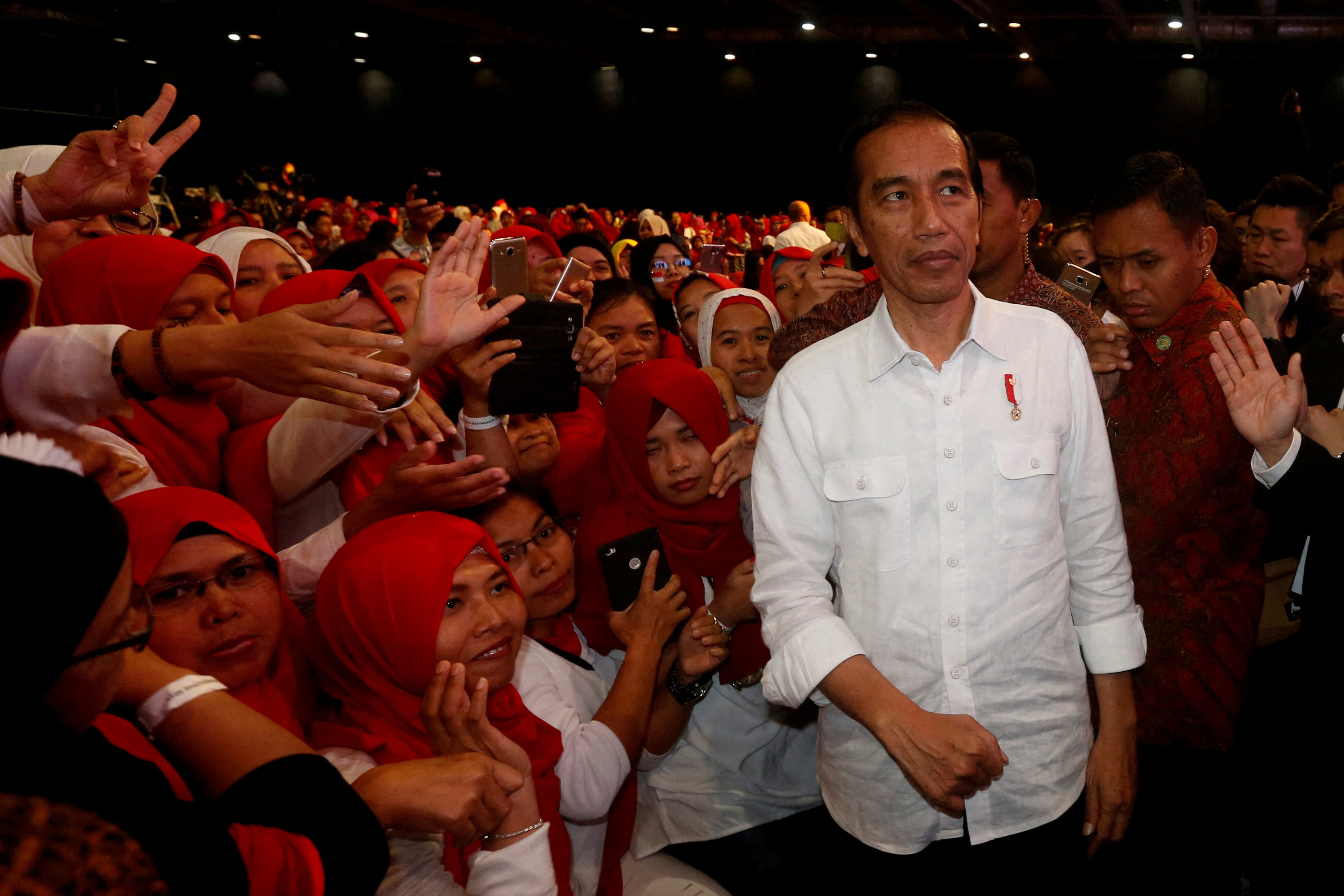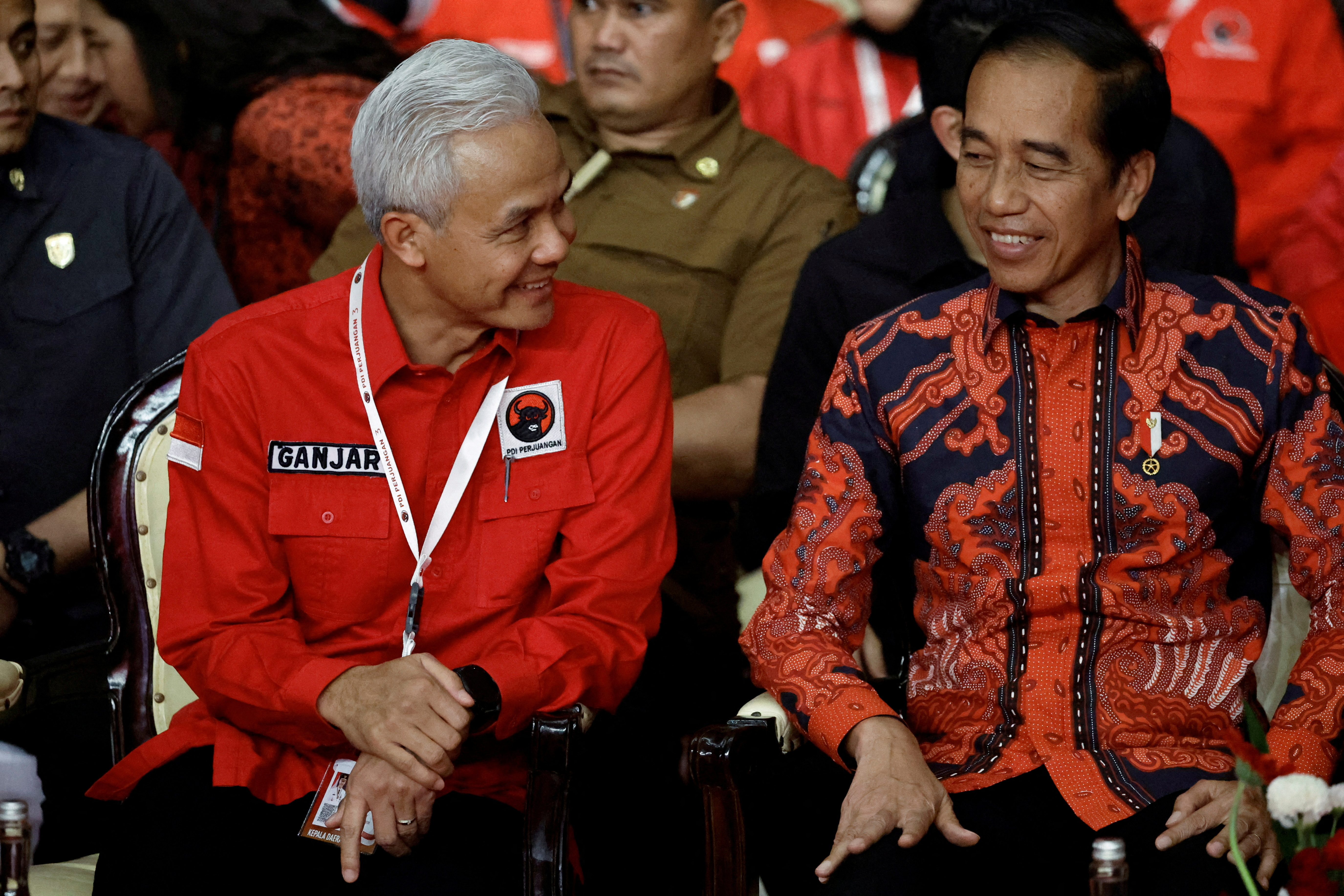At the peak of his power but unable to contest next year’s presidential election, Indonesia’s wildly popular leader, Joko Widodo, is hedging his bets between the top two candidates and nurturing a dynasty to ensure a lasting influence, sources say.
While Jokowi, as he is known, has appeared to back the contender from the ruling party, he has also been covertly marshalling support for controversial ex-general Prabowo Subianto to run Southeast Asia’s largest economy, four people with direct knowledge of the deliberations told Reuters.
Both leading candidates have indicated they will continue Jokowi’s economic policies, signalling continuity for flagship projects like moving the capital away from Jakarta and developing an electric vehicle industry in the trillion-dollar G20 economy.
But deepening Indonesia’s patronage and dynastic politics would be at odds with democratic reforms the world’s third-largest democracy has achieved since throwing off authoritarian rule a quarter-century ago, analysts say.
“This is just showing that he is every bit as much a transactional, practical and self-interested politician as his contemporaries,” Sana Jaffrey, a research fellow at Australia’s National University, said of the president’s divided loyalties.
“He is just not ready to part with power yet.”
The presidential palace did not respond to multiple requests for comment.
Jokowi is not allowed to seek re-election after serving the maximum two terms.
The ruling Democratic Party of Struggle (PDI-P), of which he is a member, has named a regional governor, Ganjar Pranowo, as its candidate. He is running against Prabowo, who lost the top job to Jokowi twice before joining his cabinet as defence minister in 2019.
A September opinion poll put Prabowo ahead of Ganjar 34% to 30% with a third candidate trailing. Other surveys show a tighter race.
The endorsement of Jokowi, who commands approval ratings of 80%, will have direct bearing on who wins February’s election.
In the strongest signal yet about who Jokowi is likely to throw his weight behind, his vast, informal volunteer network this week announced that all its regional branches had proposed Prabowo as their candidate of choice.
The hinted endorsement was the latest and most public move in what 10 sources describe as an opaque “double game” that Jokowi has been playing for months.
In August, Jokowi abruptly summoned the head of Golkar, Indonesia’s second-largest parliamentary party, to the palace, and instructed him to endorse Prabowo, even though the party had been poised to declare support for Ganjar, four sources with direct knowledge of the meeting said.
The National Mandate Party (PAN) received the same instruction, two sources said.
Days later Golkar and PAN announced support for Prabowo, giving him the largest party support base.
PAN denied this account, while presidential staffers and Golkar did not respond to requests for comment.
Jokowi has also lent support to Ganjar, deploying teams and volunteer groups to work on his campaign, four sources said.
As recently as September, the president appeared on stage at a national PDI-P event, telling the crowd he had advised Ganjar to start planning for the day he would lead the nation.
“I whispered to him, ‘After you’re inaugurated – a day after you’re inaugurated – you have to take care of food self-sufficiency. Don’t take too long’,” Jokowi said.
Ten sources say the moves to secretly back Prabowo were likely prompted by Jokowi’s desire to carve out his own power base amid a deepening rift between Jokowi and PDI-P chair Megawati Sukarnoputri, a stalwart of Indonesian politics who has in the past played kingmaker herself.
Jokowi has also engaged in talks about vice presidential picks for both Ganjar and Prabowo, three sources said.
The head of Ganjar’s campaign team said he was unconcerned about the claims as Jokowi had explicitly expressed for support for Ganjar’s candidacy, something he has not done for any other candidate.
The backroom machinations are striking in a country that in 1998 forced a corrupt and nepotistic autocrat, Suharto, to step down after three decades in power.
Jokowi was elected in part because he was seen as independent from the Suharto-era old guard, while Prabowo is Suharto’s ex son-in-law and the former head of the special forces.
In his decade in power, analysts say, Jokowi has deepened Indonesia’s entrenched patronage politics, although this has done little to dent his popularity across the sprawling archipelago of more than 270 million people.
“It’s not just patronage as usual, it’s brazen in a way that we haven’t seen for a long time,” said ANU’s Jaffrey.
Recent developments also suggest Jokowi has an eye on building his nascent dynasty.
His eldest son, Gibran Rakabuming Raka, the 36-year old mayor of Surakarta, has been touted as a possible vice presidential candidate for Prabowo, although the legal minimum age is 40.
The Constitutional Court, headed by Jokowi’s brother-in-law, is expected to rule on Monday on requests to lower the age limit.
Jokowi’s youngest son, Kaesang Pangarep, 28, was recently appointed head of the Indonesian Solidarity Party just days after joining.
In Medan, Indonesia’s third-largest city, Jokowi’s son-in-law, Bobby Nasution, is the mayor.
With the uncertainty over where Jokowi’s loyalties lie, these placements are deliberate, said Yoes C. Kenawas, a research fellow from Atma Jaya University who studies dynastic politics.
“Ganjar and Prabowo are ‘Jokowi’s men’ but who knows after Jokowi steps down,” he said. “Blood is thicker than water.”
Related Galleries:


The post Jokowi, Indonesia“s kingmaker, works to keep influence after election first appeared on The News And Times – thenewsandtimes.com.
